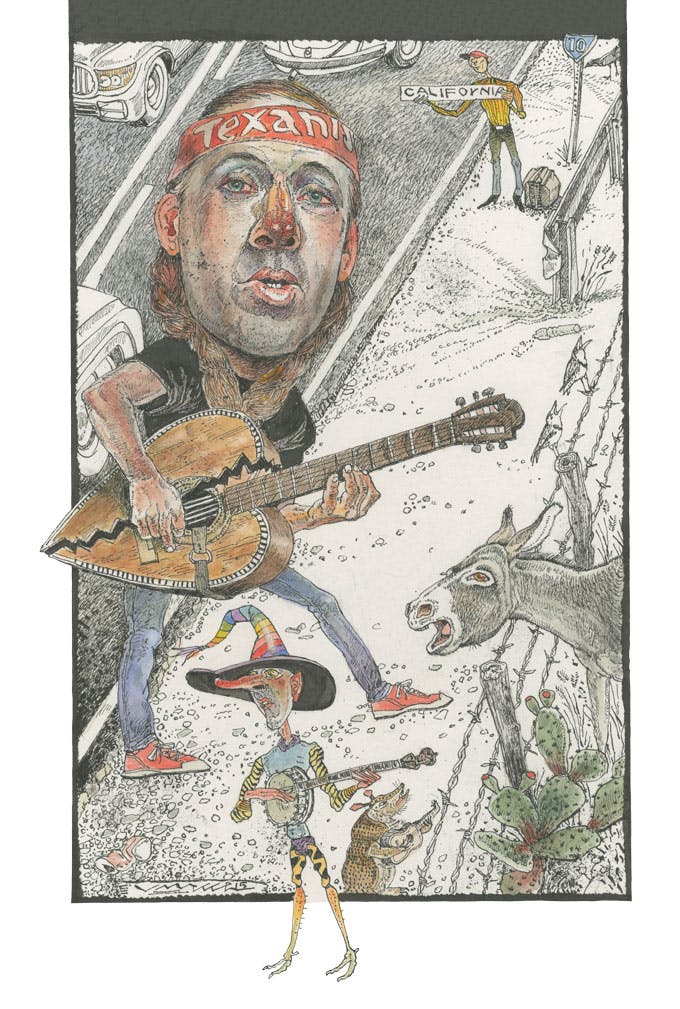
Q: I just found out that the boy I’ve been dating for the past month and a half not only doesn’t like Willie Nelson’s music but actually dislikes his politics and everything else about him. Other than this, I have found him to be a pretty flawless guy. But is not liking Willie a deal killer?
Name Withheld, Lubbock
A: In all the years the Texanist has been doling out advice to those in need of it, he doesn’t recall having ever been confronted with a situation quite like the strange and troubling one you have presented to him here. But then he’s never in his whole life come across anyone quite like this beau with whom you’ve been carrying on recently. The Texanist isn’t sure where you’d even meet a person like this. And he’s spent time in some of the world’s seedier cantinas, discotheques, and all-night truck-stop cafes. Even among the most unsavory acquaintances he’s had the displeasure of making in these shabby dens, he’s never met anyone who holds Willie Nelson in such low regard. Of course, everyone is entitled to their own musical proclivities. The Texanist, for example, is an admitted Wayne Newton fan. (Hey, it’s his knocking-back-a-scotch-with-a-splash-of-water-and-two-ice-cubes-while-shining-up-for-a-night-on-the-town music! So what?) But disliking Willie—as a singer, a songwriter, an outlaw (of the mostly harmless variety), an unabashed Mary Jane enthusiast, and an incomparable treasure to all of humanity—speaks to your dude’s character. What’s this guy’s deal, anyway? Nobody is here to tell anybody that somebody has to appreciate a particular musical artist as a prerequisite to being anybody’s boyfriend, but by shunning Willie’s transcendent tunesmithing, ever-pleasant warble, and overall munificence, this fellow has really shown himself to be, at the very least, a birdbrain. In short, you’d have to be crazy (see what the Texanist did there?) to continue in this doomed relationship. If you’d like, the Texanist would be happy to make the phone call for you.
Q: I have two massive bois d’arc trees outside my house that are near a pasture where I run a few Hereford. In the fall my grandchildren have a ball throwing the horse apples over my fence so that the cattle can eat them, which is great because so many litter the ground. They are a sticky nuisance, and if you aren’t careful, they will knock you on the head when they fall from the limbs. And just when you think you’ve cleared them out, another round covers the ground. I believe that everything in this world has a good purpose, but could horse apples be the one exception to that rule?
Nancy W., Bells
A: The bois d’arc (pronounced “bo-dark”) tree (or sometimes hedge), also known as Osage orange, horse apple, hedge apple, hedge, mock orange, bodark (pronounced “bo-dark”), and, ahem, monkey ball, is native to Central and East Texas. The name “bois d’arc,” French for “bow wood,” is owed to the fact that Native Americans prized the tree’s exceptionally durable wood for use in making bows and war clubs. The same wood, for the same reasons, was also used in wagon-wheel construction. And before the invention of barbed wire, the trees themselves were widely employed as hedgerows and live fencing. The large green fruit of the tree, the horse apples with which you are so blessed, has historically been found to be somewhat less useful. But in line with your optimistic outlook on the purposefulness of all things—a view the Texanist admires, by the way—there are options for horse apples besides just the dreading of their annual appearance. Unusual as it may sound, it is said that placing a number of horse apples in and around your home will repel both spiders and roaches. Additionally, they can be used—believe it or not—as a unique crafting material. Think festive flower arrangements and decorative centerpieces. And the Texanist recalls playing a crude bocce-like game thanks to a prolific horse-apple producer up the street from his childhood home. Maybe you could start a weekend tournament. Without even realizing it, though, it sounds as if you’ve already found a pretty good use for your abundant crop. The Texanist can think of few things, all of the aforementioned included, better than spending a little outdoor time with the grandkids on a cool North Texas afternoon. Note: horse apples don’t come with a choke hazard warning, but cattle have been known to do just that while trying to ingest them. Keep an eye out. The Heimlich maneuver can be tricky on a cow.
Q: How big a knife can I legally carry on my person in Texas?
Calvin Spellings, Austin
A: It is illegal to publicly carry a knife with a blade exceeding five and a half inches in Texas. Yes, with apologies to Jim Bowie, the Texanist did say exceeding five and a half inches. But as long as your tickler doesn’t surpass this length and is not a dirk, a dagger, a stiletto, or any other kind of stabbing knife, you are welcome to carry it either out in the open or concealed. And it can be a folding knife (even a switchblade) with or without a locking mechanism or a sturdy fixed blade. Until a change in the rules last year, this was not the law of the land. Back then, individual cities were allowed to lay out their own restrictions on knives. For instance, it was illegal to have a locking blade in San Antonio, and a knife in Corpus Christi couldn’t have a blade with a length in excess of a mere three inches. There’s a drawer in the Texanist’s bathroom that is home to the small collection of clip and pocketknives from which he arms himself each morning. None are excessively showy or have great big blades, but he finds that any one of these trusty shivs will usually get the job done just fine.
Q: I am a reasonably healthy 47-year-old guy with a reasonably healthy diet and live a reasonably healthy lifestyle, but I’ve been a happy carnivore my entire life. With the recent news about meat consumption causing cancer, I’m considering giving it up altogether. Does this sound like a good resolution for the coming new year?
Glenn Samson, Houston
A: If the Texanist were Glenn Samson, he would think long and hard before entering into a year-long contract like the one you have proposed. Such agreements with oneself, nonbinding though they generally are, can be the source of a lot of unhealthy stress and self-inflicted misery. Now the Texanist, as he is often reminded by the magazine’s legal department, is not a scientist with the World Health Organization’s International Agency for Research on Cancer, nor is he a doctor, a dietician, a physical trainer, or even a person who should be commenting in any way on the topic of an exemplarily healthful diet from any personal experience. But, like you, the Texanist read about the WHO’s recent findings. Processed meats (bacon, sausage, frankfurters, beef jerky, ham, corned beef, pastrami, et cetera), the report says, are “carcinogenic to humans.” Red meat (meat from cows, pigs, goats, sheep, bison, deer, et cetera), they say, is “probably carcinogenic to humans.” Over the years, the Texanist recalls similar nutritional commotions that were caused by negative findings associated with coffee, chocolate, eggs, whole milk, booze (“Danke schoen, darling, danke schoen . . .”), coconut oil, and other foods that were eventually rethunk. The Texanist can’t say this will happen with the processed-and-red-meat cancer connection, but he will say that he is keeping his fingers crossed. Back to your question, though. If the Texanist were Glenn Samson, he would worry that the sudden loss of pleasure derived from occasionally slicing into a succulent ribeye, tender brisket, or peppery sausage would cause such a strain to his system that any potential positive from the dietary change would, in turn, be negated tenfold by the same change. Just thinking about it is causing a lot of twitching and a little sweating. The Texanist isn’t authorized to give medical advice, but again, if he were Glenn Samson, he might opt for moderation with the meats and just resolve to take more long walks in the coming year.
The Texanist’s Little-Known Fact of the Month: Among all the colorfully named “entertainment” districts once featured in so many Texas towns—Guy Town, in Austin; Happy Hollow, in Houston; Feather Hill, in Mobeetie, to name but a few—there is a tie between Hogtown, in Tascosa, and Boggy Bayou, in Dallas, for the dubious honor of least-inviting designation.








